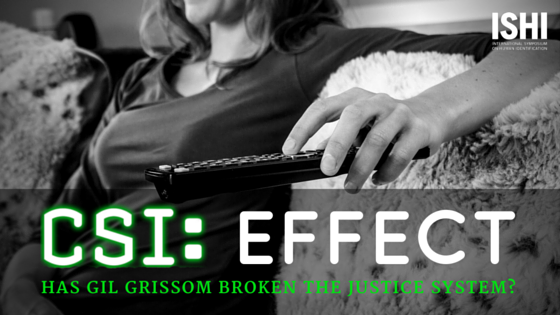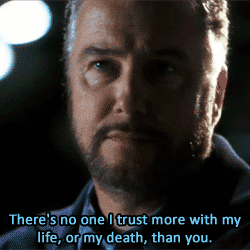According to Entertainment Weekly, crime drama television shows accounted for 13 of the top 50 television shows watched during the 2014-2015 season. The number of viewers these television shows brought in is a staggering 159.46 million viewers. With these kinds of numbers, it’s safe to say that the average American citizen is familiar with the role that DNA plays in putting away the bad guy – or at least they THINK they are.
Written by: Tara Luther, Promega Corporation
Enter the ‘CSI Effect’, which suggests that jurors who are regular viewers of the television show CSI will have unreasonably high expectations of the type of forensic evidence produced by the prosecution. The concern is that if these expectations are not met, guilty parties could go free.
I think we can all agree that it’s unlikely for a crime to occur, evidence to be collected and subsequently analyzed, and the perpetrator to be identified/arrested all in under 60 minutes. Beyond that, how much of what is portrayed represents the truth, and what does an average jury member expect to see presented during trial? How has saturating the television market really effected the justice system?
A study done in 2006 by Gregg Barak, Ph.D., Young Kim, Ph.D., and the Honorable Donald E. Shelton set out to discover if potential jurors were swayed by what they had viewed in crime dramas on television. The study asked 1,027 randomly summoned jurors in Ann Arbor, Michigan a series of questions regarding their television-viewing habits, including the programs they watched, how often these programs were watched, and how “real” they thought the programs were. Barak, et al then asked the potential jurors what evidence they expected the prosecution to put forth, and how likely they would be to find a defendant guilty based on which types of evidence were presented.
The study revealed that 46% of those surveyed expected to see some kind of scientific evidence presented in every criminal case and 22% expected to see DNA evidence produced in every criminal case. Further, of those surveyed, a higher number had expected to see DNA evidence produced in the more serious violent offences (murder, attempted murder, rape) than in other types of crimes. The study also showed that the more frequently an individual was to watch a certain television program, such as CSI, the more accurate they deemed the program to be.
According to 2006 study, 46% expect to see scientific evidence presented in every criminal case. Share on X
At the heart of the study was this question – would a juror demand to see scientific evidence presented before finding a defendant guilty? The results showed that a potential juror was more likely to find a defendant guilty (even without scientific evidence) IF the victim or witness testified, except in the case of rape. If a prosecutor were to rely on circumstantial evidence, however, the respondents said they would require some kind of scientific evidence to be presented prior to returning a guilty verdict.
The study concluded that, based on these results, although those who watched CSI had higher expectations for scientific evidence, these expectations had little impact on whether or not they would convict the defendant.
The question then becomes how accurately does this study represent what happens in an actual courtroom? If the study were to be replicated today, after another 10 years of watching crime dramas, would the results be different?
According to an article in the New York Post in September of 2015, the CSI Effect has not gone away. The article describes a suspect who was caught two blocks from the scene of the crime with a gun inside his backpack and multiple witnesses, yet he was acquitted due to a lack of DNA evidence.
Much has been discussed on how the CSI Effect impacts juries, but jurors aren’t the only ones watching the crime dramas. Do attorneys also experience the CSI Effect? Is it possible that tests are being ordered based upon what is seen on television, or as a way to include forensic evidence in a trial in an effort to please potential jurors?
Do attorneys also experience the CSI Effect? Click the link to read one analyst's opinion. Share on X
Below is one perspective of an analyst with 12 years of experience at 3 different agencies.
We’ve all heard about it — the amazing and unrealistic things that are done with forensic science on TV shows that skew public perception of the field. It makes forensic scientists look like wizards who are able to turn a partial footprint at a crime scene into a mug shot, current address, phone records and credit card statements. I know that a lot of criminalists dislike this inaccurate portrayal of the field and throw things at the TV when they do things like this, but I don’t think that any of us can be upset at the incredibly favorable light that the public views us in. While this wizard status is great from a jury, it’s problematic when the DA’s office or detectives are affected by it as well. We had a case where a pair of guys were going on a burglary spree, and one or the other’s DNA profiles were on almost every piece of evidence submitted. Only one of them was a mixture, with a major profile matching one of the suspects and an uninterpretable minor profile. The DA’s office requested that we do Y-testing on the item to try to get a mixture of both suspects so that they could prove that the two were working together, because finding their individual profiles across multiple residences “wasn’t enough.” We had to inform them that our lab doesn’t do stats on Y mixtures to the audible disappointment of the DDA over the phone.
While it’s fun to be one of the most interesting people in the room at parties, it’s certainly a little deflating to have to explain that you’re not actually a rock star to attorneys and cops. It’s certainly better than being undervalued and unappreciated though!
What have you experienced in your labs? Do you agree with the study that Barak et al produced and that there is limited evidence of the CSI Effect impacting cases, or do you see a need for additional learning and communication to be provided to all members participating in the justice system?
WOULD YOU LIKE TO SEE MORE ARTICLES LIKE THIS? SUBSCRIBE TO THE ISHI BLOG BELOW!



